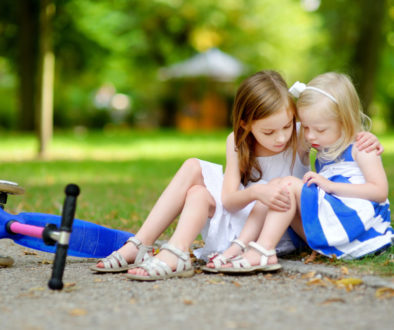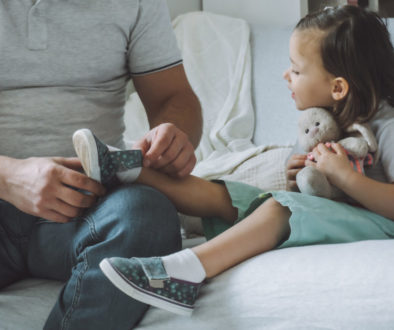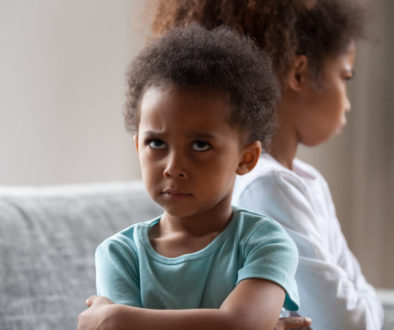Learning to say “I’m Sorry”

Every parent has witnessed the “say you’re sorry!” interaction when a little one has upset another child. However, young children are often told to say “I’m sorry” long before they are developmentally capable of feeling remorse. Saying sorry is important to parents because it’s part of having good manners, however teaching the act of saying sorry is very different from helping our children to have genuine empathy for others. The concept of “I’m sorry” is abstract and young children are concrete learners. Little ones are not able to understand that words can have the same effect as actions, whether it’s hitting or a hug.
Children do not develop the ability to understand that other people have thoughts and feelings different from their own until around 4-5 years of age. Young children’s brains are wired to believe that the world revolves around them (in many cases, it does!). During the toddler years, kids need adults to help them learn how to respond in social situations because they don’t yet understand that other people may feel differently than they do.
Since we ultimately want our children to be able to authentically apologize when they are developmentally able to, it’s important to not force them to give an automated “I’m sorry” without also helping them understand what empathy is. However, we also don’t want to ignore negative actions because our child is too young to understand what it means to feel sorry. So, what can we do instead?
- Ask and Listen
If your child has hurt another person or made a mistake and needs help making amends, try to listen to their side of the story. Before forcing a canned apology, stay open and be curious. You may ask, “Can you tell me what happened?” or “I’d like to know what is going on. Maybe I can help.”
- Stay Away from Blame
Blame and shame limits growth and learning. Listening without blaming your child let’s them know that they are safe to honestly express themselves, even if they did make a poor choice. Everyone makes mistakes and its often where a lot of growth and learning happen. So, use these moments to offer grace and as a learning opportunity for your little one.
- Tap into Empathy
Mistakes happen, encourage your child to notice how they are feeling in these moments, and then encourage them to think about how someone else might be feeling too. Even very young children can answer simple questions like “How are you feeling?” and “How do you think taking that toy from Logan made him feel?” “How can we help him feel better?” These may seem like small things, but they are a valuable part of helping your little one learn about empathy and making amends.
- Have Patience
A forced or rushed apology very rarely feels authentic. Children often need time to process what happened before they are able to feel genuinely remorseful and ready to make amends. Admitting making a mistake is not always easy and can feel uncomfortable, even for adults! Patience and flexibility are necessary so that more authentic feelings can come to the surface (which may come only after some tears and denial).
- Notice the Sincere Apologies
When children are sincere in their apology, it doesn’t always look how we expect and it tends to be spontaneous; A smile, a big hug, helping someone up or offering to share a valued toy. Children might apologize differently than an adult would, and that is ok. Remember, it’s about the intention not just the words “I’m sorry.”
- Normalize Apologizing
No one is perfect. Making mistakes is part of being human so take opportunities to model humility and apologize when you mess up. This involves taking responsibility for your mistakes and sometimes swallowing your pride, even in moments that you might feel your buttons pushed. Children don’t learn from you being a perfect parent, they learn from watching how you navigate the ups and downs of life. Showing them your own humility and willingness to make amends, is the most valuable tool you have. When we normalize apologizing in front of our children and to our children, we are teaching them that it’s not the ‘falling down’ that matters, it’s how we get back up and learn from our mistakes.
Remember that teaching a child when to apologize and how to make amends is a gradual process. Insisting that your child apologize can easily become a power struggle, instead, consider the age and stage of your little one and have faith that with a little patience and time, they will learn to take responsibility for their mistakes, show remorse, and make authentic apologies, just like you.





